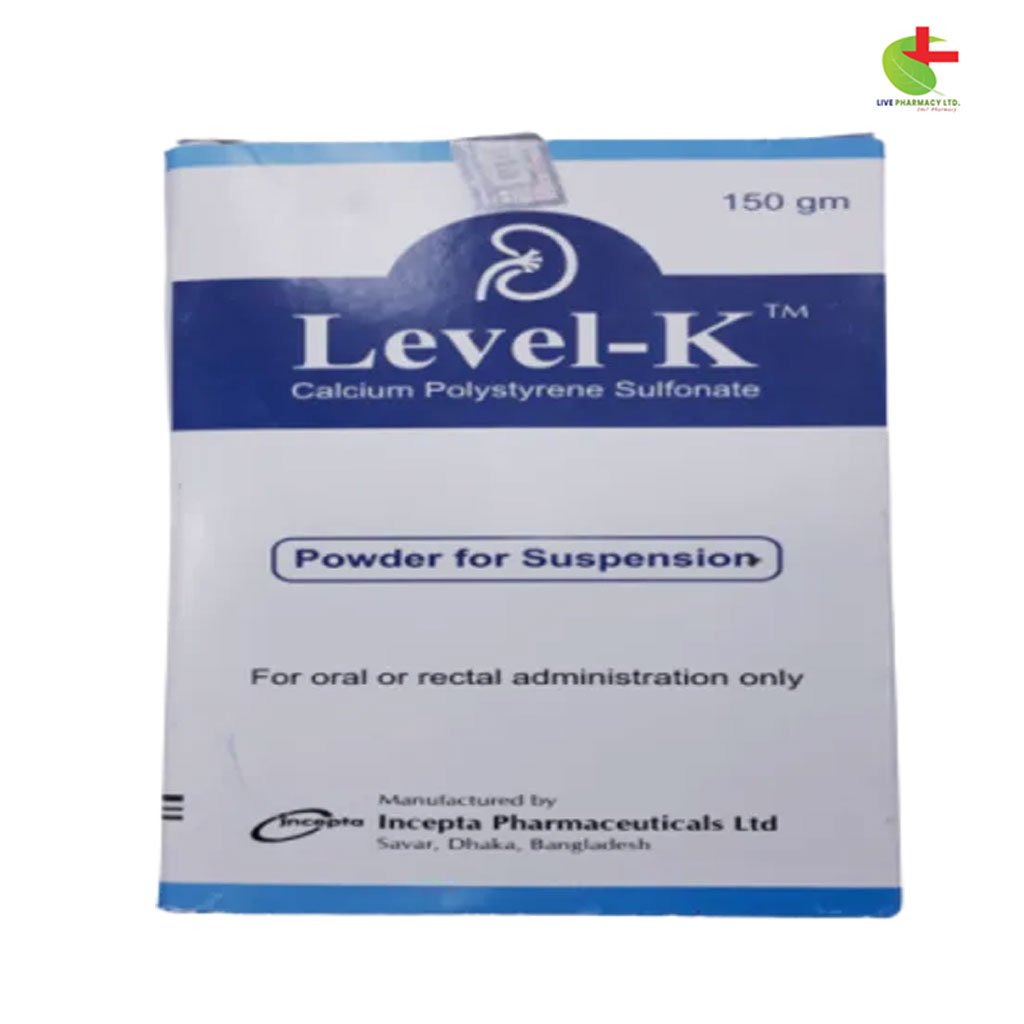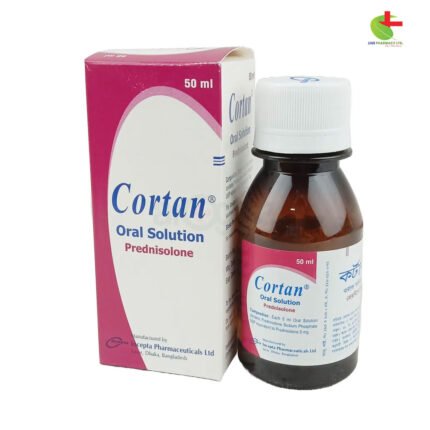Level-K
980.00৳ Sachet (150gm)
- Level-K is a treatment for hyperkalemia, often caused by kidney disease, liver failure, or certain medications.
- It works by exchanging sodium for potassium in the intestines, helping to reduce potassium levels in the body.
- Available in both oral and rectal forms, the dosage is tailored to the patient’s condition and age group.
- Regular use should be guided by a healthcare professional to prevent electrolyte imbalances and other side effects.
 Brand
Brand
|
Incepta Pharmaceuticals Ltd |
|---|---|
 Generics
Generics
|
Sodium Polystyrene Sulfonate |
 Size
Size
|
Oral Powder |
Indications
Level-K is prescribed for treating hyperkalemia, a condition commonly resulting from acute or chronic kidney disease. Other potential causes include liver failure, adrenal insufficiency, and the use of certain medications such as ARBs, ACE inhibitors, beta-blockers, or excessive potassium supplements.
For use only under the direction of a registered physician.
Pharmacology
Sodium Polystyrene Sulfonate is a cation exchange resin that releases sodium ions in the stomach in exchange for hydrogen ions. When the resin reaches the large intestine, it exchanges hydrogen ions for free potassium ions, which are then expelled through the feces. This process reduces potassium absorption into the bloodstream and increases potassium excretion, effectively lowering the body’s potassium levels.
Dosage Guidelines
For Adults (including elderly):
- Oral: The typical daily dosage ranges from 15g to 60g (1 sachet taken 1-4 times a day).
- Rectal: For patients who cannot take the medicine orally, it can be administered rectally as an enema. A dosage of 30g to 50g is given once or twice daily at six-hour intervals. Each dose is prepared in a warm emulsion (150-200 ml) of either water, 10% dextrose, or a mixture of water and 2% methylcellulose. The solution should be gently agitated and administered at body temperature. A follow-up cleansing enema is recommended.
For Children:
- Oral: In smaller children and infants, lower doses should be administered based on body weight, with 1g per kg daily in divided doses for acute hyperkalemia. For maintenance, this can be reduced to 0.5g per kg.
- Rectal: When oral administration is not feasible, the resin can be given rectally. The dose should be the same as oral, suspended in 10% dextrose solution. After retention, the colon should be irrigated to ensure the resin’s removal.
For Neonates:
- Rectal: The oral route is not recommended. Rectal administration should be used with a dosage of 0.5-1g/kg of resin. After administration, the colon must be thoroughly irrigated to ensure proper resin removal.
Always follow the advice of a registered healthcare professional.
Administration Instructions
To prepare, mix each dose in a small amount of water or a sweetened liquid, avoiding potassium-containing juices like orange juice. For better palatability, use syrups. The suspension should be freshly prepared and administered with the patient in an upright position. For patients with renal failure, the suspension can be combined with their diet. Avoid heating the drug, as it may affect its properties. Do not store the suspension for more than 24 hours.
Drug Interactions
Level-K may interact with medications like antacids, non-absorbable cation-donating antacids, digitalis, sorbitol, lithium, and thyroxine.
Contraindications
Do not use Sodium Polystyrene Sulfonate in patients with hypokalemia, hypersensitivity to polystyrene sulfonate resins, obstructive bowel disease, neonates with reduced gut motility, or for oral administration in neonates.
Potential Side Effects
Gastric irritation, anorexia, nausea, vomiting, and constipation may occur, particularly at higher doses. Other risks include hypokalemia, hypocalcemia, and sodium retention, which may lead to clinical symptoms. In rare cases, colonic necrosis and intestinal obstruction may develop.
Pregnancy and Lactation
Level-K falls under Pregnancy Category C, meaning its safety for pregnant women has not been established. It should only be used during pregnancy if absolutely necessary. It is also unknown whether the drug passes into breast milk, so caution is advised for nursing mothers.
Precautions and Warnings
Level-K should be used cautiously in patients unable to tolerate even small sodium increases, such as those with severe congestive heart failure, hypertension, or edema. In cases of significant constipation, discontinue use until normal bowel function returns. Avoid using magnesium-containing laxatives or sorbitol.
Special Populations
For pediatric patients, the efficacy of this drug has not been confirmed, and in neonates, it should not be administered orally due to the risk of digestive hemorrhage or colonic necrosis.
Overdose Risks
Overdosing can lead to electrolyte imbalances such as hypokalemia, hypocalcemia, and hypomagnesemia, with symptoms ranging from irritability and confusion to muscle weakness and paralysis.
Therapeutic Class
Calcium Regulator
Storage Instructions
Store Level-K below 30°C and keep it out of reach of children. The suspension should be freshly prepared and not stored for more than 24 hours.













Reviews
There are no reviews yet.